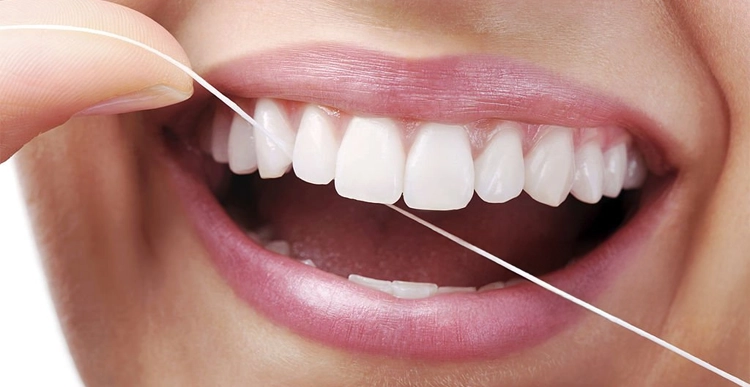“Dişlerimi her gün fırçalıyorum, neden diş ipi kullanayım ki?” Eğer siz de böyle düşünüyor ve diş ipi kullanımını gereksiz buluyorsanız, belki de dişlerinizi sadece %60 temizlediğinizi bilmiyorsunuzdur. Peki, geriye kalan %40 ne oluyor? İşte cevabı…
Why Brushing Your Teeth Isn't Enough?
You may brush your teeth regularly, but this alone is not enough for healthy teeth! Because toothbrushes cannot fully reach the narrow spaces between the teeth while cleaning the tooth surfaces.
The truth is:
The toothbrush only cleans the outer surface of the tooth.
Plaque and food residues between the teeth remain in areas that the bristles cannot reach.
Without flossing, these hidden plaque builds up, which is the main cause of cavities and gum disease.
To summarize: When you brush your teeth, you only clean the visible part. However, bacteria accumulate mostly in the areas where the teeth touch each other and the only way to clean these areas is to floss.
What Happens If You Don't Floss?
If you are not flossing, you may have these 5 serious problems:
1. Tooth Decay
When the areas between the teeth are not cleaned with a brush, the bacteria there start to produce acid. The result? Interdental caries!
Most tooth decay starts in the interdental spaces.
When these caries are not recognized, they can progress into the tooth and lead to root canal treatment.
2. Gum Diseases (Gingivitis and Periodontitis)
If you don't floss, the bacteria that accumulate under the gum line start to infect the gums.
First symptoms: Bleeding gums, swelling and tenderness
Progressive stage: The gums recede and the tooth roots are exposed.
Endpoint Tooth loss!
Flossing is one of the most effective ways to protect not only the teeth but also the gums.
3. Bad breath (Halitosis)
One of the biggest causes of bad breath is the decay of food residues between the teeth by bacteria.
You can prevent this bad odor by flossing every day.
4. Tartar Formation
When dental floss is not used, the plaque between the teeth hardens over time and turns into tartar.
Tartar is the main cause of gum disease and bad breath.
Flossing prevents plaque accumulation and minimizes tartar formation.
5. Negative Effects on General Health
Perhaps the most striking fact is that gum disease can affect your whole body, not just your mouth.
According to research, gum diseases are linked to serious health problems such as heart disease, diabetes, respiratory infections. So by flossing, you are not only protecting your mouth, but your whole body!
Is Flossing Really Hard?
Many people think flossing is laborious. However, with the right technique, this process takes only 1-2 minutes and prevents major health problems.
How to use dental floss correctly?
Cut a piece of dental floss about 40 cm long.
Wrap it around the middle fingers of both hands and guide it with your thumb or index fingers.
Gently place it between the teeth and wrap it in a "C" shape, moving up and down.
Avoid too hard movements to avoid damaging the gums.
Alternatively, interface brushes and water-powered teeth cleaning devices are also a good option for people who have difficulty flossing.
Conclusion Is Flossing Really Necessary?
Diş fırçalamak, ağız temizliğinin sadece %60’ını karşılar.
Bacteria and food residues between the teeth can only be removed by flossing.
People who do not floss are more prone to cavities and gum diseases.
Regular flossing protects not only your oral health but also your general health.
Then the question is:
"Is it easier to be too lazy to floss, or to deal with tooth loss and expensive treatments years later?"
You should start flossing today for healthy teeth and gums!
You can consult us for a healthier mouth. You can get detailed information about teeth cleaning and gum diseases in our clinic!


